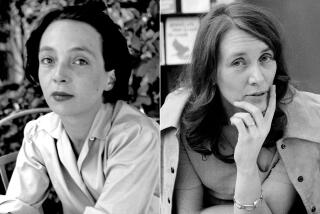Outside: SELECTED WRITINGS by Marguerite Duras; translated by Arthur Goldhammer (Beacon: $19.95; 247 pp.)
- Share via
“Outside,” a collection of Marguerite Duras’ writings over the past 30 years for newspapers, magazines, art gallery notes and record jacket blurbs, is a book that redefines journalism. As Ernest Hemingway set the style for journalists in his time with his book “By Line,” so Duras sets the tone for journalism in our times. No aspiring journalist, no school of journalism should be without this book.
It is a book by the ultimate foreign correspondent--the correspondent who lives in the mental territory outside nationalism but in the midst of humanity. Duras can and does report humanity with all its vagaries, peculiarities and fears. Her writing manumits journalism and her subjects. She has learned, she says in “Outside,” that loving is the best way of living. A fact that the true journalist must know if she is to accurately record life in her times.
Duras’ new book is a collection of writings about the warfare between “principalities and powers of this world” in the lives of its citizens. There are pieces about what it is like to be an Algerian in France in the ‘50s and a Jew in Warsaw in the early ‘40s. There are pieces about strong women, Maria Callas, Margot Fonteyn, and in them Duras asks all the right questions.
“Who is she?” she asks of the actress Delphine Seyrig. It is a paraphrase of the question that Jesus asked about the magdalen, “Seest thou this woman?” Duras tells us what she sees and knows about Seyrig and about what Seyrig says about herself, and neither Duras, Seyrig nor the reader is insulted by the answers. Duras is probably the best writer in the world about women and about who they are and how they want to be known.
And yet there is nothing maudlin, sentimental, nothing that smacks of mere romanticism in Duras’ view of the women and men in her world. Duras, who is French and grew up in Indochina, is not obscure. She transcends her country, her upbringing, and she never forgets it at the same time.
One fragment from “Outside,” illustrates this point. In an interview with a Carmelite nun who was once a political prisoner, there is this exchange:
Q: Is the opportunity for what you call unlimited rebellion one of the “attractions” of prison?
A: Yes. It’s also a gift. I have seen delinquents on whom prison exerted a kind of fascination, much like the fascination that the convent exerts on certain Carmelites, especially the simpler girls. Because, you know, there are nuns who claim to have endured 20 years of darkest night when in fact they’ve simply spent 20 years in a vacuum.
More to Read
Sign up for our Book Club newsletter
Get the latest news, events and more from the Los Angeles Times Book Club, and help us get L.A. reading and talking.
You may occasionally receive promotional content from the Los Angeles Times.










